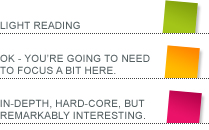One of the big problems that search engines face when indexing pages is deciding which text on the page is important, and which is part of the menu, or part of an advert for something completely unrelated. The new HTML5 tags neatly compartmentalise the content of the page, and make the job of the search engine infinitely easier.
Or do they?
In the early days of internet search, the search engines decided to take up the keywords and description meta-tags as significant in indexing and ranking pages. As soon as the benefits of appearing at the top of a search engine query result screen became evident, webmasters began to look for ways to increase their rankings by ‘spamming’ the search engines – placing long lists of basically unrelated keywords into their meta tags, and in hidden blocks on their pages, so the search engine robot would find and read those keywords, and mistakenly rank the page highly.
This was a common practice, and any search engine that survived into this century had to have developed sophisticated algorithms for identifying and discounting such tactics.
New Tactics
The new HTML5 tags will inevitably spawn a new wave of such tactics, but I doubt they’ll be even vaguely successful this time. The search engines will all be on top of the possibility way before the webmasters cotton on to the idea. The search engines are never going to trust the markup of webmasters ever again. You can be sure they already have algorithms for identifying spam in HTML5 pages, and removing it.
Unfortunately, that means the effectiveness of the new tags is greatly reduced. Rather than making life a lot easier for the search engines, the new tags actually create bigger problems for the them, because they now have a whole new set of algorithms to write. The search engines won’t trust the tags, and will, at best, use them as just one of many clues to the relative importance of the content.
Meta-tags
This doesn’t make the new markup useless, however. The keyword and description meta-tags are still used by Google and other search engines, and so will the new tags. Google uses the meta-tags to help them identify which keywords you feel are the most important and, if they decide you aren’t trying to fleece them, they’ll take that into account when indexing the content of your page. The meta-tags don’t have a lot of influence, but they count a little.
The new HTML5 tags will have the same effect, so they should probably be used, unless there is a good reason to not use them.


